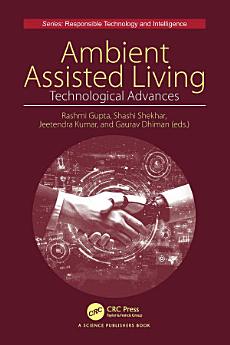Ambient Assisted Living
About this ebook
This book delves into cutting-edge AAL technologies, including AI-driven gait analysis for diagnosing and classifying disorders like Parkinson's disease, assistive robotics to enhance daily living, and Blockchain-based token incentive systems for transparency and engagement. It also explores AI-powered diet management for diabetes patients, NLP applications in clinical decision-making, and large language models for healthcare analytics. The book highlights GAN-based solutions for emergency staffing and resilient scheduling, demonstrating AI's role in optimizing healthcare operations. The book also examines multisensory rooms for engaging children with disabilities, emphasizing inclusive technology design. Ethical concerns in AAL, ensuring that innovation aligns with societal values and patient dignity are also addressed. With insights into practical applications, challenges, and future directions, the book serves as a guide for researchers, practitioners, and policymakers, offering a comprehensive vision of how technology can revolutionize healthcare and empower individuals.
About the author
Rashmi Gupta has a PhD degree in Computer Applications from the National Institute of Technology, Raipur, India. She is an Assistant Professor in the Department of Computer Science and Application at Atal Bihari Vajpayee University in Bilaspur, India. She has over 11 years of teaching experience, her research interests encompass Natural Language Processing, EEG signal processing, and Human activity recognition. She has published more than 25 research papers, conference papers, and book chapters. Dr. Gupta has also undertaken peer-reviewing responsibilities for esteemed publishers. She has been awarded grants by AICTE to organize the ATAL Faculty Development Program and by the Science and Engineering Research Board, DST for conducting High-end Workshops and Internships. Moreover, she has successfully organized numerous faculty development programs under the AIU-Academic and Administrative Development Centre at Atal Bihari Vajpayee University, Bilaspur. Demonstrating her commitment to mentorship, Dr. Gupta has guided over 30 PG and 20 UG students in their research-related major projects. She has been invited as a resource person to deliver lectures at various Workshops and Faculty Development Programs. She is also a member of prestigious academic societies such as IEEE, the Indian Science Congress, the International Association of Engineers (IAENG), the International Computer Science and Engineering Society (ICSES), and the International Association of Academicians (IAASSE).
Shashi Shekhar has been an Associate Professor in the Department of Computer Engineering & Applications, at GLA University, Mathura, India since 2020. Experience of 20+ years in Teaching, Research, and Administration. He has taught courses at both undergraduate and postgraduate levels in the area of Computer Science & Engineering covering research methods in Information Retrieval and Natural Language Processing domain. He has published over 46 articles in peer-reviewed journals (SCI/Scopus/WoS) and conferences. He has also Supervised 8 Postgraduate (MTech Thesis) and 4 PhD scholars in the area of Natural Language Processing and Information Retrieval.
Jeetendra Kumar holds Ph.D. degree from GLA University, Mathura and working as an Assistant Professor in the Department of Computer Science & Application at Atal Bihari Vajpayee University, Bilaspur, India for the last 11 years. He has published research articles in reputed journals and conferences, including topics like sentiment analysis, fall detection using machine learning techniques, IoT applications, automatic question generation, etc. He has also contributed book chapters on topics related to neuroscience, smartphone applications, and fog computing in healthcare. He has completed research projects sponsored by the State Planning Commission, C.G., and Commonwealth Media Centre for Asia (CEMCA) New Delhi and Atal Bihari Vajpayee University, Bilaspur. He is also a member of prestigious academic societies and associations such as IEEE, the Indian Science Congress, the International Association of Engineers (IAENG), the International Computer Science and Engineering Society (ICSES), and the International Association of Academicians (IAASSE).
Gaurav Dhiman holds a PhD in Computer Engineering from Thapar Institute of Engineering & Technology, Patiala, India and has also completed his Master’s Degree of Computer Applications from the same institute. He is an Assistant Professor in the School of Sciences and Emerging Technologies, Jagat Guru Nanak Dev Punjab State Open University, Patiala. His research has been recognized at the highest level, as he has been named one of the world's top researchers by Stanford University, USA list of world's top 2% scientists prepared by Elsevier. He is the senior member of IEEE. He has also received accolades for his outstanding reviewer work from Knowledge-Based Systems (Elsevier). He has authored over 300 peer-reviewed research papers, all of which are indexed in SCI-SCIE, and 10 international books.




